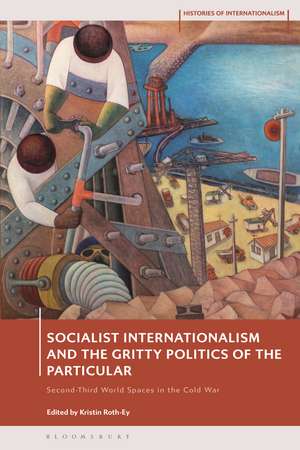Socialist Internationalism and the Gritty Politics of the Particular: Second-Third World Spaces in the Cold War: Histories of Internationalism
Editat de Kristin Roth-Eyen Limba Engleză Hardback – 3 mai 2023
Din seria Histories of Internationalism
- 30%
 Preț: 511.31 lei
Preț: 511.31 lei - 30%
 Preț: 512.46 lei
Preț: 512.46 lei - 23%
 Preț: 192.82 lei
Preț: 192.82 lei - 30%
 Preț: 511.40 lei
Preț: 511.40 lei - 23%
 Preț: 199.45 lei
Preț: 199.45 lei - 23%
 Preț: 200.26 lei
Preț: 200.26 lei - 23%
 Preț: 200.89 lei
Preț: 200.89 lei - 23%
 Preț: 192.36 lei
Preț: 192.36 lei - 23%
 Preț: 192.73 lei
Preț: 192.73 lei - 30%
 Preț: 510.42 lei
Preț: 510.42 lei - 30%
 Preț: 511.48 lei
Preț: 511.48 lei - 30%
 Preț: 511.23 lei
Preț: 511.23 lei - 30%
 Preț: 510.17 lei
Preț: 510.17 lei -
 Preț: 250.59 lei
Preț: 250.59 lei -
 Preț: 250.59 lei
Preț: 250.59 lei - 18%
 Preț: 599.16 lei
Preț: 599.16 lei
Preț: 511.89 lei
Preț vechi: 732.06 lei
-30% Nou
Puncte Express: 768
Preț estimativ în valută:
97.96€ • 101.20$ • 81.53£
97.96€ • 101.20$ • 81.53£
Carte tipărită la comandă
Livrare economică 25 martie-08 aprilie
Preluare comenzi: 021 569.72.76
Specificații
ISBN-13: 9781350302785
ISBN-10: 1350302783
Pagini: 296
Ilustrații: 10 bw illus
Dimensiuni: 156 x 234 mm
Greutate: 0.59 kg
Editura: Bloomsbury Publishing
Colecția Bloomsbury Academic
Seria Histories of Internationalism
Locul publicării:London, United Kingdom
ISBN-10: 1350302783
Pagini: 296
Ilustrații: 10 bw illus
Dimensiuni: 156 x 234 mm
Greutate: 0.59 kg
Editura: Bloomsbury Publishing
Colecția Bloomsbury Academic
Seria Histories of Internationalism
Locul publicării:London, United Kingdom
Caracteristici
Explores multiple spaces of encounter between Second and Third world actors during the Cold War
Notă biografică
Kristin Roth-Ey is Associate Professor of Modern Russian History at the UCL School of Slavonic and Eastern European Studies, UK. She is the author of Moscow Prime Time: How the Soviet Union Built the Media Empire that Lost of the Cultural Cold War (2011). Her current research focuses on Soviet media and cultural diplomacy in the Third World during the Cold War.
Cuprins
Introduction, Kristin Roth-Ey (University College London, UK)1. The School: Integrating North Korean children within socialist Eastern Europe, 1951-1959, Péter Apor (Hungarian Academy of Sciences, Hungary)2. The Airwaves: How Do You Listen to Radio Moscow? Moscow's Broadcasters, 'Third World' Listeners, and the Space of the Airwaves in the Cold War, Kristin Roth-Ey (University College London, UK)3. The Great Industrial Project: Space, Sovereignty, and Production Cultures at Egypt's Aswan High Dam, Elizabeth Bishop (Texas State University, USA)4. The Exhibition: Spaces of Cultural Encounters, Radina Vucetic (University of Belgrade, Serbia)5. The Epistolarium: Socialist Internationalism Writ Small: Friendship, Solidarity and Support between Women in the Soviet Union and in Decolonising Countries, 1950s-1960s, Christine Varga-Harris (Illinois State University, USA)6. The University. The Decolonisation of Knowledge?: The Making of the African University, the Power of the Imperial Legacy, and the Eastern European Influence, Malgorzata Mazurek (Columbia University, USA)7. The Expert Community: Expert Knowledge and Socialist Virtues- Czechoslovak Military Specialists in the Global South, Mikulás Pesta (Charles University Prague, Czech Republic)8. The Military Training Camp: Experiences of PAIGC guerrillas in Soviet Training Camps, 1961-1974, Natasha Telepneva (University of Strathclyde, UK)9. The Hospital: Romania's "One Nation Hospital" in Gharyan, 1974-1985, Bogdan C. Iacob (Institute of History Bucharest, Romania)10. The Trade Union: Kindred by choice. Trade unions as interface between East Africa and East Germany, Eric Burton (University of Innsbruck, Austria)11. The Everyday Space: The hostel, the pub, and the prison: Vietnamese and Cuban Workers in 1980s Czechoslovakia, Alena K. Alamgir (Georgia Institute of Technology, USA)12. The Travelogue. Imagining Spaces of Encounter: Travel Writing Between the Colonial and the Anti-Colonial in Socialist Eastern Europe, 1949-1989, Eric Burton, Zoltán Ginelli, James Mark, and Nemanja Radonjic (University of Innsbruck, Austria, National University of Public Service Budapest, Hungary, University of Exeter, UK )BibliographyIndex
Recenzii
This impressive new project sheds the tired binaries as it seeks to complicate the story of cold war encounters between the Second and Third worlds. I particularly appreciate the emphasis on cultural and social history through the exploration of the spaces that often remained unseen and unexamined, but which were in fact the sites of real human-to-human encounters. The contributors' attention to the mundane and the granular represents a welcome departure from the standard grand narratives of the Cold War.
This brilliantly edited volume invites readers right into the military units, work sites, dorm rooms, and other tense spaces where socialist internationalism unfolded, revealing a welter of unexpected consequences: Korean orphans studying Czech folk songs, Polish faculty teaching British economic theory to Ghanaian university students, Romanian women seeking abortions in Libya, and more.
This brilliantly edited volume invites readers right into the military units, work sites, dorm rooms, and other tense spaces where socialist internationalism unfolded, revealing a welter of unexpected consequences: Korean orphans studying Czech folk songs, Polish faculty teaching British economic theory to Ghanaian university students, Romanian women seeking abortions in Libya, and more.
